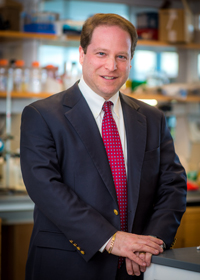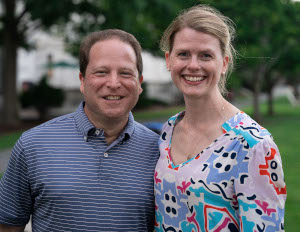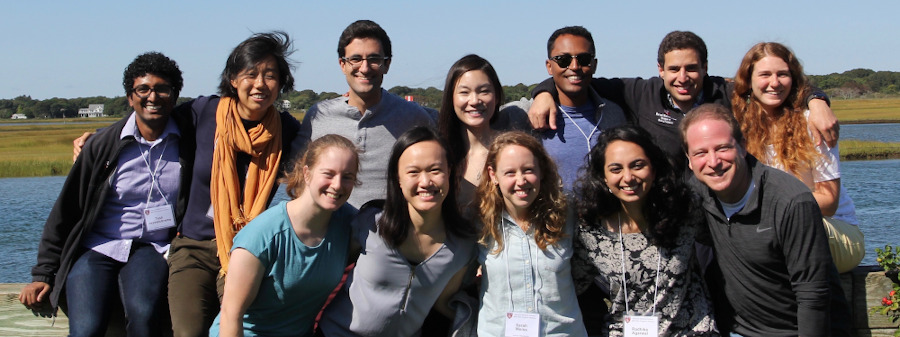Welcome from the Director and Program Overview
 Welcome to the website of the Harvard/MIT MD-PhD Program! We believe that physician-scientist training here at Harvard and MIT provides a remarkable opportunity to engage in compassionate medical care and breakthrough research alongside an astoundingly vibrant faculty and student body. The MD-PhD Program is singularly focused on creating an integrated, nurturing and community-oriented environment so you can flourish - personally and professionally - during your time with us. What makes our program special? In my view, it’s the unparalleled depth and breadth of clinical and research opportunities balanced by a profoundly caring, invested, and brilliant community of students, colleagues and mentors.
Welcome to the website of the Harvard/MIT MD-PhD Program! We believe that physician-scientist training here at Harvard and MIT provides a remarkable opportunity to engage in compassionate medical care and breakthrough research alongside an astoundingly vibrant faculty and student body. The MD-PhD Program is singularly focused on creating an integrated, nurturing and community-oriented environment so you can flourish - personally and professionally - during your time with us. What makes our program special? In my view, it’s the unparalleled depth and breadth of clinical and research opportunities balanced by a profoundly caring, invested, and brilliant community of students, colleagues and mentors.
MD-PhD Mission
Our mission is to train the next generation of premier and diverse physician-scientist leaders, who represent a rich spectrum of clinical disciplines and research areas from basic and translational sciences to bioengineering to the social sciences.
MD-PhD and the HMS MD Curricula
Our MD-PhD students benefit from the choice of applying to two Harvard Medical School educational tracks, namely Pathways and Health, Sciences, and Technology (HST). The Pathways track features a large and diverse class of students whose interests span the gamut of liberal arts education. The Pathways curriculum starts with a 14 month intensive introduction to the essentials of medical education with prompt entry to the wards by October of Year 2. In Years 3 and 4, hospital-based experiences are balanced with classroom-based educational components that emphasize an intimate linkage between pathophysiology and patient relevance. For a more quantitative, engineering, and research-focused approach to learning medicine, there is the HST track, which features a much smaller class that is exquisitely focused on the science behind the medicine, emphasizing mechanism and innovation. The HST curriculum follows a more traditional sequence with didactic class work that runs through Years 1 and most of Year 2, with the transition to the wards beginning in the spring of Year 2. Years 3 and 4 follow a hospital-based clinical rotations schedule. Roadmaps and timelines for MD-PhD education for both Pathways and HST tracks can be found here.
MD-PhD courses
Students begin their training in the summer before the first year of medical school by taking a course called “Investigations of Human Disease.” This class is especially designed to introduce the entering MD-PhD students to current disease-oriented research problems, and to develop their critical thinking skills. Throughout the MD-PhD training experience, our program offers an expansive paracurriculum that includes noon clinical case conferences, MD-PhD grand rounds, an evening seminar series on MD-PhD careers, alumni mixers, and so much more. To ease the transition back to the hospital, the program offers a Reintroduction to Clinical Medicine, which is a “boot camp” style course that includes clinical didactics, simulations, rounding with inpatient care teams, and one-on-one supervised patient encounters with a clinical faculty mentor.
 Breadth and Depth of Research Opportunities
Breadth and Depth of Research Opportunities
One of the most remarkable aspects of MD-PhD training at Harvard and MIT is the essentially unlimited options for PhD training across the campuses of Harvard Medical School, Harvard University, MIT, the Whitehead Institute, the Broad Institute of Harvard/MIT, and all of the affiliated Harvard hospitals, including Brigham and Women’s Hospital, Children’s Hospital Boston, the Dana-Farber Cancer Institute, Massachusetts General Hospital, the Joslin Diabetes Center, the Harvard Stem Cell Institute, and so many more. The faculty embedded in this enormous diversity of clinical and research environments offer you tremendous choice, but more importantly, unmatched opportunities to conduct innovative research that transcends disciplines and technologies. What’s more, the environment of innovation in the Cambridge biotechnology sector affords real world opportunities to translate your innovations into next-generation diagnostics, devices, and therapies. Our MD-PhD students can train in essentially any department and specialization that Boston has to offer from the basic and engineering sciences, to the broad spectrum of social sciences spanning history of science, epidemiology, economics, medical anthropology, health policy, and more.
Funding
The Harvard/MIT MD-PhD Program at Harvard Medical School (HMS) has been sponsored in part by the National Institutes of Health (NIH) through its Medical Scientist Training Program (MSTP) since 1974. All MD-PhD student applicants to our program compete on equal footing for MSTP support, regardless of scientific interest. That is, we provide full and equal MSTP support to our basic and social science MD-PhD students. And, for those students who matriculate to Harvard Medical School without MSTP funding but decide to pursue both degrees, we have an “open tent” policy that welcomes you into our community, with formal MD-PhD matriculation upon acceptance to a Harvard or MIT graduate program. We also do our very best to help you garner at least partial support for your MD-PhD training; in recent years, full support has been available to fund the third and fourth years of medical school for our affiliated students. The bottom line is this: we do not distinguish between those students who do and don’t have MSTP support when it comes to providing our MD-PhD students with administrative and advisory support, and our robust menu of academic and social activities.
 The MD-PhD Community
The MD-PhD Community
Finally, I would like to emphasize the importance we place on community. We are a large program with approximately 197 students who train across an array of hospitals, campuses, and research institutions. The MD-PhD Program provides the glue that brings this community together making what may at first seem large feel intimate. Our MD-PhD office staff and faculty leaders are dedicated to getting to know you personally and advising you at each and every step of your training. To build and sustain this community spirit, we feature a hearty array of community-based activities, including our annual summer barbecue, weekend-long retreat, MD-PhD happy hours and community breakfasts, meet-the-investigator series, noon clinical case conferences, MD-PhD grand rounds, dinners of 8 (featuring a student from each stage of training), and dinner parties at my home for our admissions revisit celebration and our annual holiday bash. We work hard and play hard recognizing that while you are training as a physician and a scientist for 7 to 9 years, you also need to live your life, cherishing friends, family, and time off.
I hope you will enjoy browsing our website and learning more about our program. As a pediatric oncologist, chemical biologist, and MD-PhD program director, I couldn’t be more enthusiastic and optimistic about the impact of physician-scientists on our society. By harnessing the arts of medicine and research, we are uniquely positioned to make a difference for our patients, always striving to identify and then tackle the most formidable challenges of human disease. We hope to inspire you to fully engage this art of the possible.
Best,
Loren Walensky, M.D., Ph.D.
Director

